Fair play — Fair pay
Leading by example
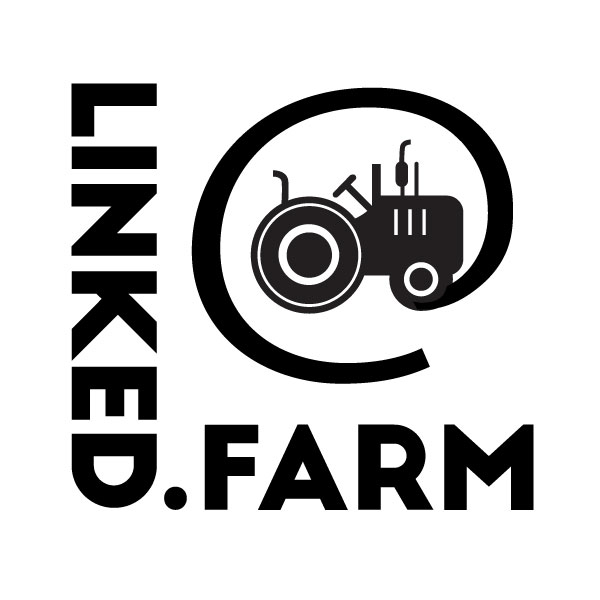
Farm2Fork made easy for B2C and B2B
Making our food systems fairer with the digital cooperative platform Linked.Farm
WHAT:
Healthy food should be the norm: straight from the farm, at affordable prices for all. A good food system creates zero waste and low emissions, transitions to more agroecological production methods, creates jobs and ensures fair remuneration of farmers. That is why Linked.Farm, a cooperative sales and distribution platform from Farm2Fork (F2) operating under a cooperative software as a service (SAAS) model was created. Linked.Farm equally distributes power and value and helps scaling the Commission’s Farm to Fork strategy by contributing to a sustainable and organic food system that is fair and makes farmers more resilient.WHERE:
BelgiumWHO & HOW:
Linked.Farm wants to make our food system fairer, more transparent and healthier. By supporting F2F actors with a digital cooperative platform, administration, invoicing and logistics become simple and affordable. Farmers as co-operators of the digital platform are central to the system, selling Business-to-Consumer (B2C) and Business-to-Business (B2B).Why a cooperative? The time of competition is over. Collaboration is becoming the new normal. Linked.Farm stimulates cooperation between producers and consumers. It is the link to tackle the challenges of sustainable and local food together in a social way. To fundamentally change the food system, we need to go beyond only looking at the agricultural system. Our cooperative includes farmers as well as F2F entrepreneurs, private individuals, restaurants and canteens who believe in a fair economy. The capital is in the hands of the stakeholders, and everyone can use their voting rights at the General Assembly to give direction to what F2F should look like.
Why F2F? F2F is the direct sale of local farm and craft products by producers, leading to a fair price for the producers and more insight into the production methods for customers. Transparency is a must. Food miles and packaging are limited. The products are seasonal, fresh and tasteful. Linked.Farm believes that F2F should gain a more significant market share in the food sector.
Why digital? Digital tools make it possible to work efficiently but often come at a high cost, both financially and humanly (e.g., precarious working conditions). The Linked.Farm platform is in the hands of the cooperative itself, enabling co-operators to decide which tools should be developed without depending on wealthy investors. The digital tools offer many advantages, such as administrative simplification, fast processing of payments, no food waste (only what is ordered is harvested), transparency and more.
MORE INFO
Find the initiative on the Linked.Farm website, Twitter, Facebook, LinkedIn and YouTube.
Contact: Laurence Claerhout, CEO, we@linkedfarm.eu, +32 47 25 08 153
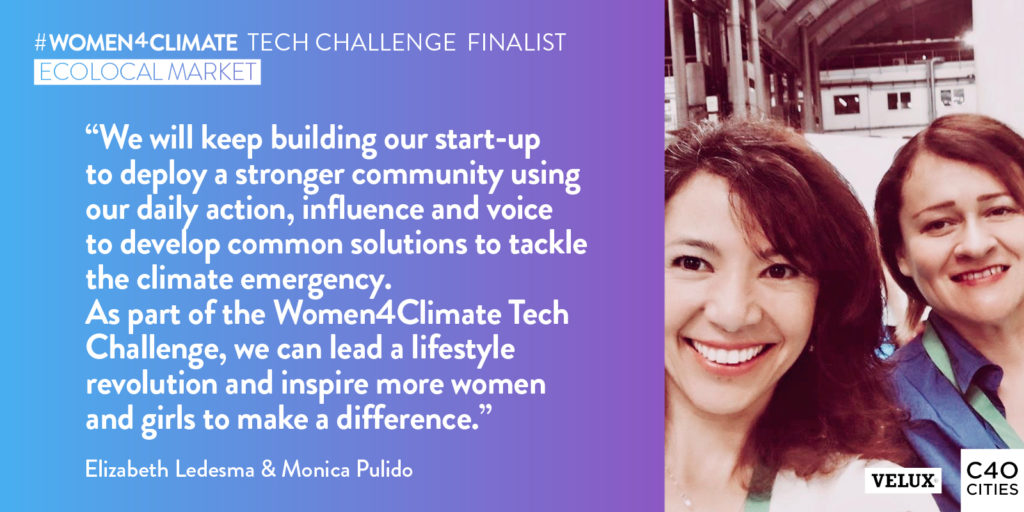
EcoLocal Market
Green Logistics for a Km Zero Organic Distribution
WHAT:
EcoLocal Market is an app created by women developers to help minimise the carbon footprint that is generated by the consumption of everyday food and beverages. Helping to connect local organic food producers to their final consumers, it operates in Barcelona since summer 2019. EcoLocal Market was a finalist in the Tech Challenge Women for Climate.WHERE:
Barcelona, SpainWHO & HOW:
EcoLocal Market is helping reconnect producers and consumers and improve the environmental performance of the food supply chain by reducing food miles. Their innovation is in the use of geo-localisation to optimise food distribution. ‘Green Logistics for a Km Zero Organic Distribution’ is a new release of the mobile app that allows members to connect with like-minded farmers, geolocates organic and local producers and consolidates deliveries to improve transport efficiency in the city centre. With EcoLocal Market the last-mile delivery will be flexible, transparent, zero-emissions. The creators of the app will keep building the start-up to deploy a stronger community – using their daily action, influence, voice, and vote for a better world of climate action.MORE INFO
Find the initiative on their website, on Facebook and on Instagram.
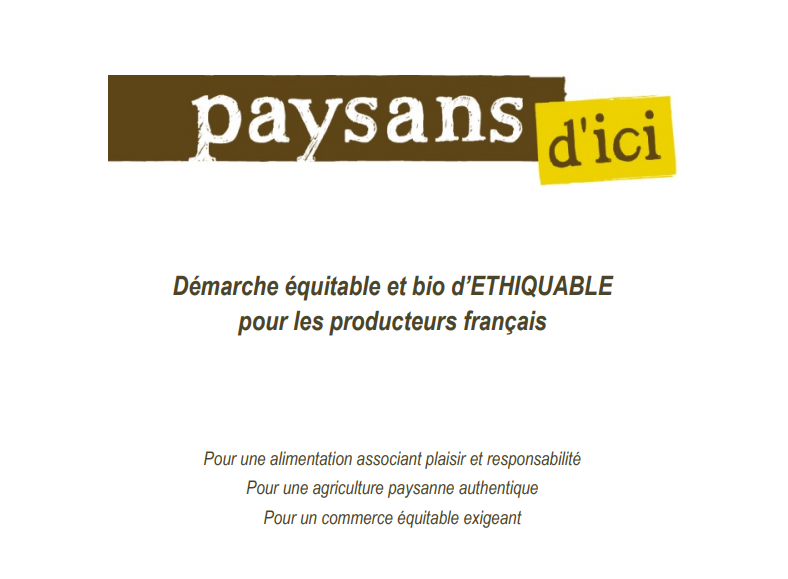
d’Ici
Organic and fair trade for French farmers
WHAT:
In its trade relations with the global South, the social enterprise ETHIQUABLE developed a code of conduct based on 24 criteria on organic peasant agriculture and fair trade. Since 2011, this approach ‘Paysans d’ici’ engages with French producers with an adapted global North-South fair-trade approach.WHERE:
France (and the world)WHO & HOW:
Paysans d’Ici involves 11 French cooperatives. Their 33 products are sold in supermarkets all over France. On average, 49.8% of the price of a local, fair and organic peasant products returns to the producer group. This ensures a decent income and livelihood for the producers. The success of the products in France shows that consumers demand greater transparency and fairness in the value chain. It also shows that rules adapted to a local context and shorter value chains can contribute to increased transparency of a product from production to consumption. This ensures fair pricing and support for organic peasant farming and leads to improved livelihoods in the global South.MORE INFO
Paysans d'ici: équitable et bio en France

PLAYING AN IMPORTANT ROLE IN THE VALUE CHAIN: TRANSILVANIA ACASĂ
Joint commercialization model that allows local producers to sell own brand in supermarkets, under the umbrella of the cluster
WHAT:
Following negotiations with two global hypermarkets present in Cluj-Napoca city, held by the management of the cluster on behalf of all cluster members, “Transilvania Acasă” isles are located inside the two biggest shopping centres in the city, commercialising the products (including organic) of seven of local producers and members of the cluster.WHERE:
North-West region, RomaniaWHO & HOW:
AgroTransilvania Cluster, set up in 2013 at the initiative Cluj County Council, is an association of 70 member organisations: agrifood producers, traders, cooperatives, local authorities, chamber of commerce, universities and research institutes from the North-West Region of Romania. The cluster promotes collaboration between business entities in the agrifood industry and encourages the competitive restructuring of the sector.
“Transilvania Acasă” (Transilvania at Home) was born in 2013 as an initiative of AgroTransilvania Cluster and the producers that are members of the cluster. At the beginning, 13 producers joined the concept and were involved in its creation and development.
“Transilvania Acasă” has an important role to play in the value chain of the cluster association, being set up to maintain cluster producers/members together, gain a position in the agrifood market, and enter to the major shopping centres to market their products. Moreover, sharing facilities allows for prices and price margins to remain competitive. The cluster association is a non-profit organization, so that the ownership of the products stays in the hands of the producers.
In addition to contributing to the short value chain presented above, “Transilvania Acasă” has been built on the premises of sustainable development, to support producers, to strengthen relationships and to create a strong brand under which products can be marketed.
As of today, the number of producers who joined the concept and market their products have grown to 23 and keeps rising.
Funding of this initiative is based on the private support of the producers who are using the cluster market channel. In addition, cluster is operating based on members’ fee and European funded projects.
MORE INFO
Felix Arion, AgroTransilvania Cluster
Email: office@agrocluster.ro, Tel: 0040751011228
This best practice is part of the SME ORGANICS project.
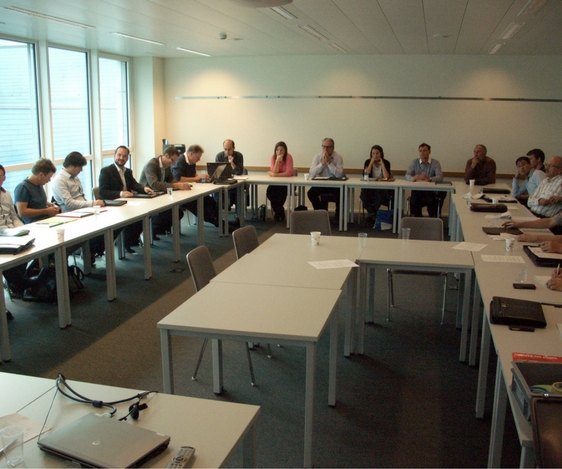
A CODE OF FAIR TRADE RELATIONS IN THE SUPPLY CHAIN IN SWITZERLAND
MAKING ORGANIC VALUE CHAIN FAIRER
WHAT:
Bio Suisse has introduced a fairness strategy to enhance trade relations between organic market partners in supply chains within Switzerland. The fairness strategy includes a code of conduct, round table discussions on fairness issues between market partners and a fairness survey to evaluate the current level of fairness in trade relations. If necessary, an elected ombudsman mediates any conflicts.WHERE:
SwitzerlandWHO & HOW:
With the fairness project, initiated in 2010, Bio Suisse is supporting respectful trade and the satisfaction of the trading partners along the whole value chain. Organic farmers, processors of organic food and traders exchange in meetings about their concerns regarding fairness and trade. The basic requirements regarding the fair relationships are included in the Bio Suisse standard.With this project, Bio Suisse is a pioneer of a fairness approach that is not based on inspection and certification, but on a comprehensive long-term dialog and care of good relationship among the partners along the whole value chain. This differs from the classical fair-trade approach that defines minimum prices and premium.
The code of conduct was developed based on several discussion events regarding fairness principles for the Swiss value chain. The participants came from farming, processing and retail, as well from consumer protection sectors. The code of conduct lays down the fairness guidelines for the Swiss market. For international trade, a slightly different code of conduct was developed.
As part of the fairness strategy, the stakeholder round table discussions have been taking place since 2011 in the milk and cereal markets. In discussion rounds, it was suggested to show good practice examples in which fair trade relationships become visible. Similar discussion rounds are also established in the fruit, vegetable and egg markets, and an interest created in the meat market. Those round tables have become an appreciated instrument with positive feedback from the stakeholders.
Ombudsman: Starting from April 2014, it is possible for every farmer to ask for support and recommendations from the especially assigned, neutral ombudsman for fair trade relations. Market participants can also file a formal complaint. The ombudsman researches the cases from all perspectives, and can make a recommendation or hold a mediation. He doesn’t have decision power, but creates transparency and publicity. The recommendations contribute that the principles of the code of conduct are made visible with concrete examples. In future, the ombudsman could treat international cases as well.
Fairness survey: The results of the first fairness survey (in cooperation with the University of Kassel, Germany) show that majority of farmers (64%) and traders (65%) with the bud label are generally satisfied with their trade relations. However, one out of five farmers and one out of four processors/traders are not satisfied with the trade relations. The survey also showed that the code of conduct represents very well the expectations of the market actors of what they feel is fair. The survey is repeated every 3-4 years.
MORE INFO
Bio Suisse - Fair Trade Relations

DEVELOPING LOCAL ORGANIC PRODUCTION IN A SOCIALLY INCLUSIVE RESTAURANT AND SHOP
Retailer and restaurant by cooperation of farmers, workers, social operators
WHAT:
‘Rete Utile Buono & Bio’ brings together organic producers, so their products can be sold via the online platform. It has the following objectives: to promote social cooperatives; to promote short distribution chain; to bring citizens closer to the consumption of organic products; to develop innovative tools for buying and selling; to offer crude and cooked organic food dish; and to improve the profit of farmersWHERE:
Bari, Apulia region, ItalyWHO & HOW:
The mission of ‘Rete Utile Buono e Bio’ is to combine the development of – mostly local – organic production with the sale and delivery of certified products. The initiative pays attention to creating training opportunities and its inclusiveness towards people with physical, mental, social and economic disadvantages. ‘Rete Utile Buono e Bio’ offers an online ordering service and home delivery, a point of sale and an easy and friendly restaurant in Bari. The costumer can choose organic products directly in the shop – both online and in ‘real life’ – and enjoy these products knowing what he eats, thanks to the traceability of the product and the selection of the producer. The main results of the initiative are:- The improvement of the distribution of regional organic products, which has allowed producers to offer a higher quality product at a competitive price with higher profit margins for all parties;
- An increase awareness of organic farmers of social paths of employment, and the development of partnerships with the social cooperatives;
- An increase in responsibility and sensitivity towards health and environmental issues;
- An increase in online ordering and home delivery to avoid an extra step in the supply chain, and to obtain an organic product at a lower price than on the market;
- An increased feeling of engagement of citizens in the economic and business development of their region through different forms of participation
- More sharing in the social economy to care for disadvantaged sections of the population and the quality of the product creating wealth and savings with a focus on environmental sustainability.
MORE INFO
Gaetano Paparella,C.I.BI.-Consorzio Puglia Natura
Tel: +39 080 2022213
Buono e Bio and Cos'è Buò
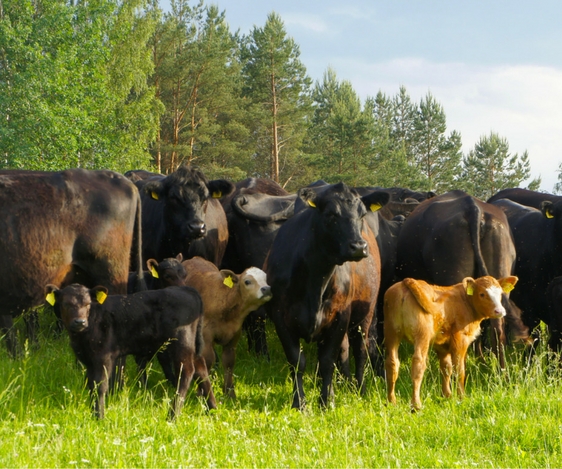
GENERATING MORE ADDED VALUE FOR EVERYONE THROUGH AN ORGANIC GRASS-FED BEEF QUALITY SCHEME
LINKING GROWERS AND CONSUMERS ACROSS THE WORLD
WHAT:
An organic grass-fed beef quality scheme that aims to give more added-value to the products and to offer better prices for their members and producers. Liivimaa Lihaveis created a government-certified quality scheme that unites organic beef farmers in Estonia. The scheme ensures welfare of the animals, sustains the biodiversity of the country's diverse grasslands and offers the highest prices to the producers.WHERE:
EstoniaWHO & HOW:
Liivimaa Lihaveis, an Estonian NGO, connects around 50 farmers who have great love and respect for nature. Our common desire is to grow happy cattle in their inherent environment - strolling around the great grasslands. The Baltic area does not have high mountains nor deep lakes, but we do have grasslands more diverse than any rainforests, containing more than 70 species per square meter. It is therefore our task to rightfully sustain and cherish these lands. Relying on this purpose, Liivimaa Lihaveis has created a governmentally certified quality scheme - ensuring welfare of the animals and sustaining the biodiversity on our diverse grasslands. Every single member is certified organic producer.
The quality scheme promotes the grazing of Angus, Hereford, and Simmental breed cattle in organic-certified farms. Throughout the grazing period, animals under the scheme must be on pastured on grassland, and during winter the cattle must have the freedom to move freely. In the summer period, cattle are grazed on land of which 50% is permanent grassland. In the winter period, animals must be provided a dry and clean place to sleep, water and enough hay and silo for every separate age group. Feeding any grain to the cattle is disallowed.
Liivimaa Lihaveis buys less animals but with the highest price of the market. Meat is sold on the basis of a true story, placing an emphasis on how animals live, what they eat, how good it is for the environment and human health. The focus on the animal diet which consists of very diversified grassland gives special and intensive taste to the meat and keeps the diversification on the grasslands.
MORE INFO
Grass-fed Beef
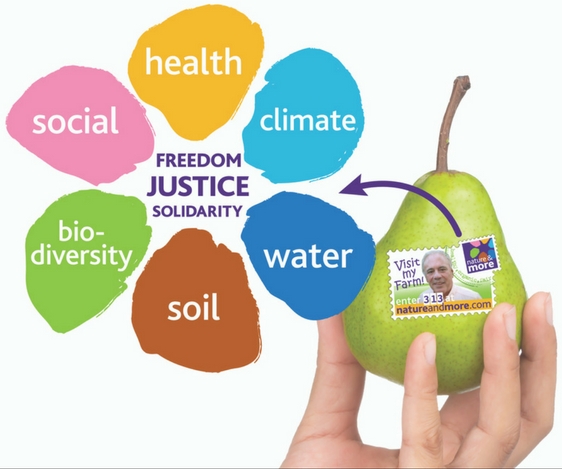
NATURE & MORE TRANSPARENCY SYSTEM AND THE TRUE COST OF FOOD
LINKING GROWERS AND CONSUMERS ACROSS THE WORLD
WHAT:
The global food market is anonymous, which leads to ruthless exploitation of the planet and the people that live on it. Food production has hidden costs such as plastic waste, water pollution, degraded soils, climate change, social disruption and conflict. We need to reconnect the grower with the consumer, show the impacts on people and planet, reveal the True Costs of Food. That is what the Nature & More transparency system does.WHERE:
The NetherlandsWHO & HOW:
Eosta (Europe’s leading specialist in organic fruits and vegetables, based in the Netherlands) developed the Nature & More system as an innovative approach to connect consumers with (organic) growers, their personal stories and sustainability efforts.
Products that are part of the Nature & More Trace & Tell System bear a three-digit code which, when entered on the Nature & More website, provides detailed information on the operations and efforts of the farmer, including photos and video.
Through our integrated sustainability model, the Sustainability Flower, we show the impact of the production in 6 categories: Climate, Water, Soil, Biodiversity, Health and Social Coherence. In many cases, we also calculated the value of these impacts in terms of money, so-called True Cost Accounting. In this way we allow consumers to compare the impacts of organic food with non-organic food and make responsible choices.
The result is clear: organic is not too expensive, but conventional is too cheap!
MORE INFO
Nature & More

RegioFair Bio Zentralschweiz
Marketing platform for organic and fair products from Central Switzerland
WHAT:
RegioFair Bio Zentralschweiz was founded in 2009 with the aim to develop a business model for SMEs in the agricultural sector manufacturing organic products. The organisation sells a broad range of products from about 100 organic farmers of the region of Central Switzerland without competing with on farm shops.WHERE:
Central Switzerland regionWHO & HOW:
RegioFair stands for organic and fair food produced in Central Switzerland. The products originate from around 100 organic farmers and processors from a clearly defined region. The marketing platform was founded in 2009 by the organic farmers associations of the region of Central Switzerland. Given the fact that about one third of organic product sales in Switzerland originates from foreign countries, the platform can be considered as a countermeasure to the fact that consumers have less and less connection to the origin of healthy products.The brand’s trademark is its high-quality products, which are all regional, seasonal and organic, as well as its unique marketing concept. The Swiss organic farmers association Bio Suisse acknowledged this by awarding the organization the first prize of the Bio Suisse Grand Prix 2017. RegioFair keeps control of its product range from the farm to the store shelf: the products are only sold through their own independent trading platform and they are sold exclusively to qualified retailers. They collaborate with specialized organic shops as well as health food shops throughout German-speaking Switzerland. Visitors, consumers and producers can get a better understanding of the underlying values of organic and sustainable agriculture, of how food it produces food and which actors are involved.
The product range includes products that fulfil high quality and fair-trade criteria and that originate from artisanal production. The Burgrain farm is one of the producers of RegioFair products, and at the same time it is a visitor centre including museum and restaurant. The farm is very diverse including agricultural production as well as food processing (it processes cheese, meat, honey and bread).
MORE INFO
RegioFair

Stimulating collaboration between organic actors across the value chain
Bio Marché, Switzerland's leading organic fair
WHAT:
Bio Marché is an annual organic fair where around 200 small-scale producers, wholesalers, processors and traders from Switzerland and abroad transform the old town of Zofingen into a huge organic food store. The products range mostly includes food but also cosmetics, textiles, plants, eco-friendly furniture and sustainable building materials.WHERE:
Zofingen, SwitzerlandWHO & HOW:
The annual fair Bio Marché is of great importance to the Swiss organic market because it gives the different actors the chance to present themselves and to attract new customers, and to observe new market trends through product and enterprise launches. Moreover, the fair strengthens existing networks and increases collaboration between the different actors of the organic market across different branches and steps of the value chain.Around 200 exhibitors present and sell their products at the fair, 80% of these products are food products, but also cosmetics, textiles and furniture (special exhibition) are present. All exhibitors and products are checked by independent external specialist agencies to ensure they meet the conditions to participate in the fair. Most of the exhibitors do not miss the opportunity to stand behind the market stall in person. This is a great opportunity for the exhibitor to get direct feedback for their products, but also for consumers to get first-hand information.
Bio Marché is supported by one of Switzerland’s leading retailers as main sponsor, but also by several other sponsors and partners, such as Bio Suisse, Switzerland's organic farmer's association, and Beobachter, a well-known high-circulation consumer magazine.
Thus, Bio Marché represents a traditional market atmosphere in a medieval town, blended with the latest market trends from the organic sector. Admission to the fair is free, so neither private nor trade visitors have to register or show any accreditation. All are welcome to this celebration of new trends in the organic sector set against the ancient backdrop of charming Zofingen.
Bio Marché takes place every June in the medieval city of Zofingen in the Canton of Aargau (Switzerland). It was first carried out in August 2000 during the IFOAM Organic World Congress taking place in Switzerland. Today it is not just a huge market but at the same time a product exhibition of products at national level, which includes concerts and various events. The fair is attended by about 40,000 visitors every year.
MORE INFO
Bio Marché AG
Email: info@biomarche.ch

REKO RINGS – LOCAL FOOD GROUP
Model for selling and distributing local food
WHAT:
REKO is model for selling and buying local food directly from producers to consumers. Products are sold based on pre-orders made through closed Facebook rings. Different producers bring their products to the same place at the same time. There are over 160 REKO rings in Finland at the moment. The REKO model has spread in other countries as Sweden, Italy and Iceland.WHERE:
Finland, spreading in Sweden, Italy and IcelandWHO & HOW:
REKO is a model for selling and distributing local food. The first REKO local food group was founded in Western Finland Pietarsaari in 2013. The model was developed by Thomas Snellman and his team.REKO’s basic functional units are local Facebook groups. Consumers order food from producers through these closed Facebook groups without middleman. A REKO ring can have a delivery meeting for example every other week at an agreed time. Producers deliver the products to the agreed market place and consumers can pick up all products they have ordered from different producers at the same time.
The rings are set up by local people and have at least on administrator. There are some ethical policies in REKO. These policies vary depending on the region and administrator of the ring has final decision-making power. Some policies are common in all REKO rings: common animal production is not allowed, wherever possible organic and free range are recommended, GMO feeds are mainly not allowed, and the use of as much local ingredients as possible is required, producers should communicate the production methods as objective as possible, and customers have the possibility to visit all farms involved.
REKO is free for producers and for consumers. There are about 3,700 producers selling their products through REKO and together 250,000 customers in all rings (as of 2017). The annual revenue was about 30,000,000 EUR/year in 2016.
MORE INFO
Thomas Snellman, REKO
Photo credit: Alisa Ylinen - Seinäjoki University of Applied Sciences
This best practice is part of the SME ORGANICS project.

Târgul Agro – Online market place for agricultural products
Târgul Agro is an online platform, meant to bring together rural supply and urban demand for agricultural and food products, including organic
WHAT:
The platform targets agriculture producers, processors, farmers, traders, warehouses, public and private organisations and consumers. It is designed to work similarly as a social network or any other platform on which both parties register and either make an offer or a demand. This virtual agricultural trade sustains ecological producers to better market their products, especially in urban areas.WHERE:
North-West region, RomaniaWHO & HOW:
The Târgul Agro online platform is designed for agricultural producers, processors and traders, consumers, and those who have storage and conservation areas and want to offer them for rent. This virtual agricultural trade fair works in a similar way to social networks. The manufacturer or merchant makes an account and uploads the photo of the product offered for sale, provides in-depth information, characteristics, colour, variety or race, as well as the quantity offered plus the price requested.By using this online tool, fresh local products gain more visibility. This helps small rural producers to sell their (mostly traditional, sometimes organic) products to urban areas, where imported products are starting to monopolize the market, and where people seem to lose touch with their cultural roots.
As of today, the number of producers who joined this platform has grown to 300 and keeps rising. Future expansion of the platform intends to include collaborations with the organic certifying bodies, so that farmers who meet organic production conditions and who obtain organic certification are properly highlighted on the site.
The most evident potential of the platform is transfer. Although the platform is a local Romanian initiative, it can easily be used in multiple languages. Its functionality is not a localized one, it is general enough, so it can be easily implemented in any other regions by making only minor changes.
This business model has a high potential for transferability, especially to urban developed communities with widespread internet access and online shopping habits. The platform can also be modified to exclusively address organic food and farming, by 'binding’ & validating organic certificates to any producer or product.
Târgul Agro is a private initiative developed by the Cluj IT cluster in the frame a project co-funded by the European Regional Development Fund under the Competitiveness Operational Programme 2007-2013. Two IT companies from Cluj IT Cluster, Optima Group and ArtSoft, have developed the platform in 2015 and currently both ensure its operational functioning, management and promotion of the business.
MORE INFO
Târgul Agro
This best practice is part of the SME ORGANICS project.

Cooperation between consumers for organic consumption
Promoting fair trade and direct relationship with producers
WHAT:
Landara is a consumers’ association for organic shopping based on direct relationship with local producers and processors, securing a fair trade for every actor. Nowadays, after 25 years work experience, almost 3,000 families are involved.WHERE:
Pamplona and surroundings, SpainWHO & HOW:
Landare is not-for-profit consumers association. Consumers join the association for a variety of reasons: to have access to organic and healthy foods at affordable prices and to find local products directly from the producer. This direct contact with producers allows them to establish just and mutually beneficial exchange relations.Landare is a way to transform the world starting from the shopping basket. At a management level, it has two centres: one in Pamplona and one in Villava, both involving 25 employees in the project. Landare also has associative participation in the working groups, in the meeting and in the assemblies to guarantee that their values are maintained and strengthened.
As an open association, if a new person wants to join, one has to participate to a brief informative meeting in which the project and the way to operate is explained. In this meeting, the organisation also informs potential participants about its values, the mode to participate at an associative level, and how the organisation creates ties with the producers and makes it purchases.
Every product sold in Landare is locally and ecologically made. In terms of distribution, 67% of what is purchased in Landare is directly ordered from the producer. This number increases to 95% when taking into account dairy and cheese.
In the "conventional" food distribution channels, the decision-making power is in the hands of a few companies and in a few people. In the case of associative supermarkets, it is possible to invest the power relations. In Landare, the partners are the main actors of the activity which has a relevant impact on society.
MORE INFO
Landare
David Garnatxo, Tel: +34 9 48 12 13 08
This best practice is part of the SME ORGANICS project.

Organic food in mass catering: BioRegione, the case of Lombardy
The rationalisation of the supply chains of mass catering services to improve the sustainability of the food sector
WHAT:
"BioRegione" is a research project run by Lombardy Region that represents a direct relationship between local production and mass catering. This sector accounts for a considerable share of the demand of foodstuff and also homogenous characteristics and seasonal menus, that make it particularly interesting to a direct relationship with local productions.WHERE:
Lombardy region, ItalyWHO & HOW:
The demand for local products continues to increase. It is expressed with different forms: short chain products, zero-km products, local products, and other terms that are often used interchangeably. To prepare about 214 million meals served annually by the mass catering in Lombardy, a considerable quantity of food products is today purchased on the global market. In parallel, the agri-food production is devoted mainly to large retailers nowadays. The possibility that a part of this products can be purchased on the regional market and, most importantly, on local markets can be a driving force for the development of LAS and especially a tool for rural development.This project has been conceived to meet the needs to find systemic solutions for the agricultural world, able to enhance the local supply chains and promote the quality of products understood in its different connotations (nutritional, hygienic-health, environmental, social quality, etc.).
Catering service is very easily suitable to build up win-win strategies on a territorial basis, pursuing different horizontal & vertical integration. Horizontal integration, where small-medium sized municipalities may jointly publish calls for tender, with the goal of making a single procedure, as well as share facilities such as cooking centres, that are often underutilized. Vertical integration, where it is possible to realize different forms of integration in the same area, between the various sectors of the mass catering: schools, hospitals, day-care institutions for elder people in order to reduce costs and streamline the service.
The development of the integration of services allows to streamline the environmental and economic costs, even by checking the optimal market conditions and sharing facilities and human resources. To increase the percentage of local and quality food, i.e., organic food, for mass catering it is necessary to facilitate the match between the demand of mass catering system and the supply chain of local products.
BioRegoine can make Europe more organic because it uses a systemic, interdisciplinary & stakeholder-based approach and interconnected actions. These actions involve several actors at different levels, e.g., economic, financial, technological, programming, etc. The combination of these actions allows to shape territorial agri-food systems, to make them economically and environmentally sustainable, and to generate positive systemic effects, reflected also in the dynamics of the supply chain.
BioRegione aims to provide the tools to activate and maintain a new network connecting demand and supply, campaign and city, optimizing flows, reducing food waste and energy consumption, and foreshadowing new solutions for the Lombardy region. The project is implemented by several universities in Lombardy Region (Department of Agricultural and Environmental Sciences - Production, Territory, Agroenergy of the University of Milan; Department of Architecture and Urban Studies; Department of Architecture, Construction Engineering and built environment of the Polytechnic of Milan). The project is co-funded by the CARIPLO Foundation.
MORE INFO
Ludovico Monforte, Unioncamere Lombardia
Email: ludovico.monforte@lom.camcom.it
This best practice is part of the SME ORGANICS project.
Do you have an initiative that makes food & farming systems across Europe fair, environmentally conscious, healthy & caring?
Click here to submit your own initiative!